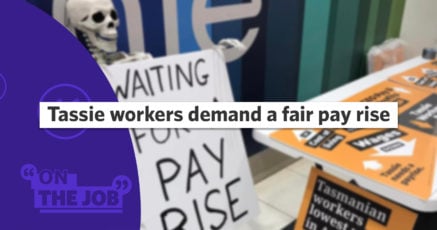Young Englishwoman, Sophie Blake, had always wanted to travel and work in Australia when she was old enough.
Before she came, she was under no illusions that getting a visa to stay longer meant doing hard, hot, tough work for next to nothing on Australia’s farms.
“I had friends who had been in Australia who told me I would be working below minimum wage. My mum, who is super honest, told me not to expect too much. She said it would be the crappiest minimum wage job,” Sophie told “On the Job”.
Despite the warnings, Sophie was still unprepared for just how exploitative and harsh Australia’s horticultural industry, which is dependent on a steady flow of cheap overseas labour, actually is.
“Oh my god, it lived up to [all the warnings] and more. I could not believe how low the rate of pay was.”
After working for piece rates, a practice where you get paid per kilo for how much produce you pick or harvest, Sophie hit the phones looking for a job that paid proper rates and found one with a farmer paying the minimum wage.
Most of her mates were not so lucky. They were toiling on piece rates in punishing conditions for next to nothing.
“I had a friend picking oranges where she was being paid $25 for each ‘bin’ she filled. It could take up to 2 hours to fill a bin and the work was in incredibly hot conditions.

“She is an able, strong woman. But she was really struggling. On top of all that, she had to pay for her transport and accommodation, which was awful, as well.”
Australian horticulture’s dirty secret about its addiction to cheap, exploited overseas workers like Sophie Blake is currently being challenged in the Fair Work Commission (FWC) in a case brought by the Australian Workers Union (AWU).
The AWU has presented its case in front of the FWC over the last two weeks, detailing countless stories from workers who have been ripped off in the fruit picking industry, with some being paid as little as $3 an hour.
Whilst there is a minimum casual rate of pay under the Horticulture Award of $25.41 per hour, many employers are baulking at paying it by using piece rates.
Piece rates were meant to be used in conjunction with the award wage as a form of incentive for higher productivity but have simply become a loophole used by dodgy farmers to drive wages down.
Dan Walton is the AWU’s National Secretary. He told ‘On the Job’ the Union was able to illustrate countless stories of worker exploitation in the industry.
“There was evidence that we provided which a highlighted workers picking blueberries on the North Coast of New South Wales being paid on average $3 an hour.
“We also saw other workers who were working on piece rates picking oranges having insufficient income to be able to provide food for themselves and were forced to go dumpster diving – essentially shifting through the back of supermarkets to try and find additional foods that the supermarkets were binning so that they are able to get enough food to survive.”
“We’re talking about 76 workers being forced to live in one house in Northern Tassie to pick berries and cherries.
“We are talking about people being forced to stay in shipping containers on farms, we’re talking about people having their passports taken off of them and being forced to remain on-site against their will to work.
“We’re talking about cases of physical violence and sexual harassment and sexual assault, all forms of abuse, and violence, and harassment that you could ever imagine happening in our backyard.”
Sophie Blake is a testament to this, forced to make a choice between her safety and meeting holiday visa requirements to work 88 days of regional farm work.
“I had a bad time. I had worked on five farms, on one of which I was sexually assaulted and harassed. It was during COVID and the backpackers left in the country just needed to do farm work. I did this job, was sexually assaulted but carried on just because I had to get the [88] days done.”
The horticulture industry had become reliant on a mix of overseas seasonal workers from the Pacific Islands, visa workers from South-East Asia and backpackers doing what has become known on the backpacker trail as the “88 days of slave” mandatory farm work in order to extend their stay in Australia for 12 months.
The COVID-19 pandemic has meant the flow of backpacker labour has dried up for now, but the exploitation goes on, according to Dan Walton, with the implementation of the AGR Visa that allows workers from South-East Asian countries to fill the gap.
“This is a decision made on the fly that will mean those workers will not have the same access to information or rights that the Seasonal Worker Program or the Pacific Labour Scheme does.
“It will absolutely guarantee that exploitation remains rife in the industry,” the AWU Secretary said.
The FWC is expected to deliver its findings on the case later in 2021.
If you or someone you know is impacted by sexual assault, domestic or family violence, call 1800RESPECT on 1800 737 732 or visit 1800RESPECT.org.au













SHARE:
Australian farms’ dirty secrets exposed